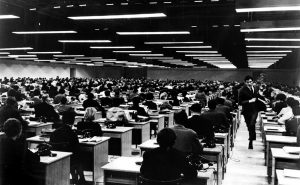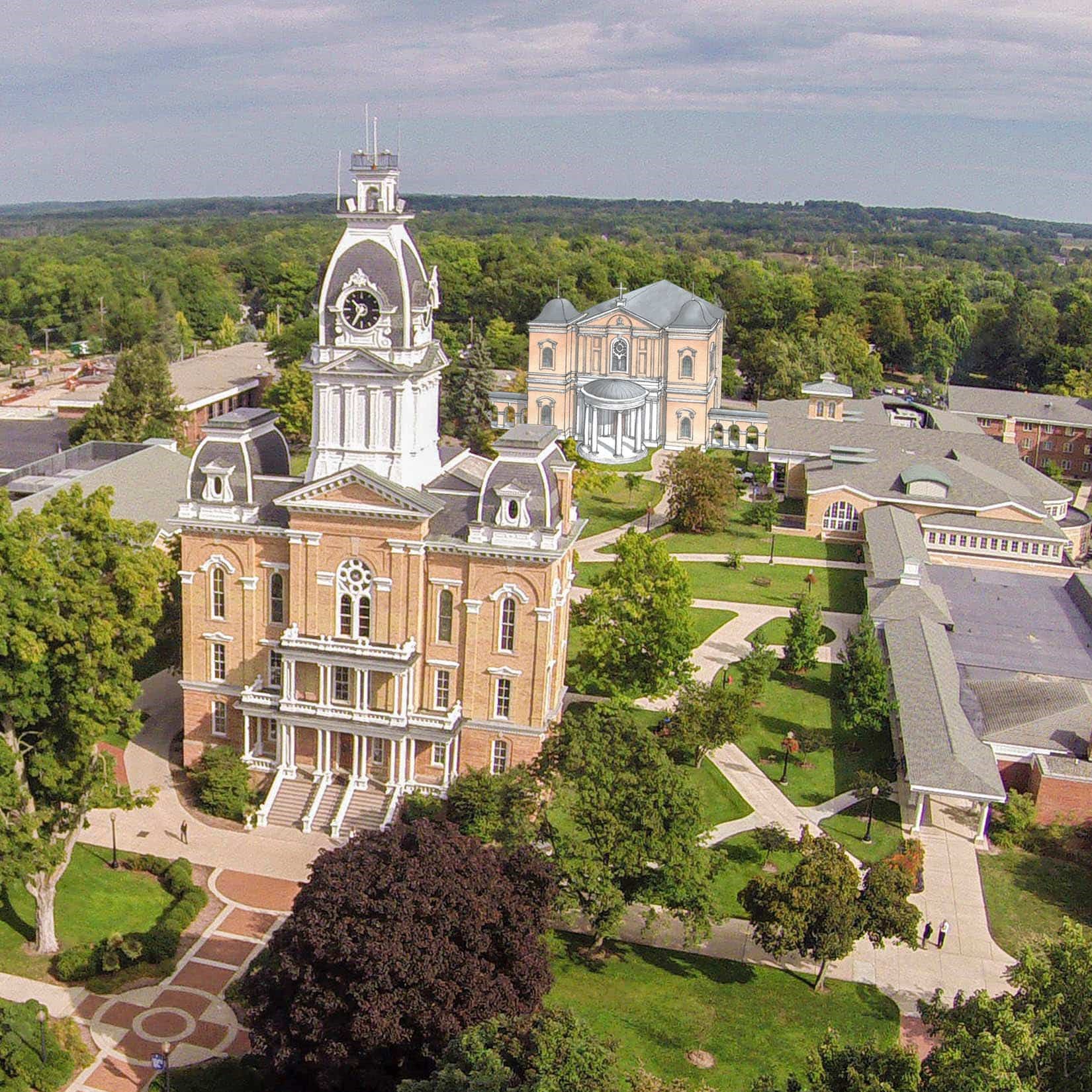Larry P. Arnn – November 2021
President, Hillsdale College
The following is adapted from a speech delivered at a Hillsdale College reception in Overland Park, Kansas, on November 18, 2021. [This piece is longer than normal, but the message is very important for our times. Ed.]
Here are two questions pertinent to our times: (1) How would you reduce the greatest free republic in history to despotism in a short time? and (2) How would you stop that from happening? The answer to the first question has been provided in these last two disastrous years. The answer to the second has begun to emerge in recent months. Both are worthy of study.
Reducing a Great Republic to Despotism
To establish despotism in a nation like ours, you might begin, if you were smart, by building a bureaucracy of great complexity that commands a large percentage of the resources of the nation. You might give it rule-making powers, distributed across many agencies and centers inside the cabinet departments of government, as well as in 20 or more “independent” agencies—meaning independent of elected officials, and thus independent of the people.
This much has been done. It would require a doctoral thesis to list all the ways that rules are made in our federal government today, which would make for boring reading. The truth is that very few people not directly involved know how all this works. Although civics education is practically banned in America, most people still know what the Congress is and how its members are elected. But how many know how the Centers for Disease Control (CDC) came to be, under what authority it operates, and who is its head? Here is a clue: it is not Anthony Fauci.
Admittedly, this new kind of bureaucratic government would take—has taken—decades to erect, especially in the face of the resistance of the Constitution of the United States, which its very existence violates. But once it has been erected, things can happen very fast.
What, for example, if a new virus proliferates around the world? There have been procedures for dealing with such viruses for a long time. They begin with isolating the sick and protecting the vulnerable. But suddenly we have new procedures that attempt to isolate everybody. This is commanded by the CDC, an element of this bureaucratic structure, and by a maze of federal and state authorities, all of which see the benefit to themselves in getting involved. The result is that large sections of our economy were closed for months at a time, and citizens placed under the equivalent of house arrest. This has not happened before. The cost of it, and not just in monetary terms, is beyond calculation.
To set up a despotism capable of pulling this off you would need the media’s help. Those controlling the media today are trained in the same universities that invented the bureaucratic state, the same universities the senior bureaucrats attended. The media would need to be willing to suppress, for example, the fact that 50,000 doctors, scientists, and medical researchers signed the Great Barrington Declaration. That document reminds people that you cannot suppress a widely disseminated contagious virus through shutdowns and mass isolation, and that if you try, you will work immeasurable destruction of new kinds—unemployment, bankruptcy, depression, suicide, multiplying public debt, broken supply chains, and increases of other serious health problems. Some of the signatories to this Declaration come from the most distinguished universities in the world, but never mind: their views do not fit the narrative propagated by the powerful. They have been effectively cancelled, ignored by the media and suppressed by Big Tech.
You would need some help from business, too. As far as influence is concerned, “business” is dominated by large institutions—those comprising big business—whose leaders are also educated in the same universities that conceived bureaucratic government and trained the bureaucrats and media heads. This provides a ground of agreement between big business and the bureaucratic state. Anyway, agree or not, businesses are vulnerable to regulation, and to mitigate the risk of regulatory harm they play the game: they send lobbyists to Washington, make political contributions, hire armies of lawyers. If you are big enough to play the game, there are plenty of advantages to be won. If you are not big enough to play the game—well, in that case you are on your own.
Amidst the unprecedented lockdowns, imagine there comes an election, a time for the people to say if they approve of the new way of governing and of this vast, unprecedented intrusion into their lives. Then let us say that in several states the election rules and practices are altered by their executive branches—the people in charge of enforcing the law—on their own, without approval by their legislatures. Say this brazen violation of the separation of powers takes place in the name of the pandemic. One does not need to know what percentage of votes in the final tally were affected to see that this is fishy. No sensible person would place control of the election process in one party—any party—or in one branch—any branch—of the government, alone. In some crucial states, that was done.
Finally, to sustain this new kind of government, you would need to work on education. You might build a system of centralized influence, if not control, over every classroom in the land. You might require certification of the teachers with a bias toward the schools of education that train them in the approved way. These schools, poor but obedient cousins of the elite universities, are always up on the latest methods of “delivery” of instruction (we do not call it teaching anymore). These new methods do not require much actual knowledge, which can be supplied from above.
As far as content, you might set up a system of textbook adoption that guarantees to publishers a massive and captive market but requires them to submit proposed books to committees of “experts,” subject of course to political pressures. You might build a standard approved curriculum on the assumption that everything changes—even history, even principles. You might use this curriculum to lay the ground for holding everything old, everything previously thought high and noble, in contempt.
Doing this, incidentally, deprives the student of the motive to learn anything out of fashion today. It is a preparation not for a life of knowing and thinking, but for a life of compliance and conformity.
This is by no means an exhaustive account of what it would take to build a thoroughgoing tyranny—for further instruction, read Book Five of Aristotle’s Politics or George Orwell’s 1984. But it gives an idea of a mighty system, a system that seems unassailable, a system combining the powers of government and commerce, of education and communication. Money and power in such a system would accrue to the same hands. The people who benefit from the system would be the ruling class. Others would be frustrated. And such a system would tend to get worse, because the exercise of unchecked power does not bring out the best in people.

Any elaborate system of government must have a justification, and the justification of this one cannot simply be that those in the ruling class are entitled on the basis of their superiority. That argument went away with the divine right of kings. No, for the current ruling class, the justification is science. The claim of bureaucratic rule is a claim of expertise—of technical or scientific knowledge about everything. Listen to Fauci on Face the Nation, dismissing his critics in Congress as backward reactionaries. When those critics disagree with him, Fauci said recently, “They’re really criticizing science because I represent science. That’s dangerous.”
The problem with this kind of thinking was pointed out by a young Winston Churchill in a letter to the writer H.G. Wells in 1901. Churchill wrote:
Nothing would be more fatal than for the government of states to get into the hands of the experts. Expert knowledge is limited knowledge: and the unlimited ignorance of the plain man who knows only what hurts is a safer guide, than any vigorous direction of a specialised character. Why should you assume that all except doctors, engineers, etc. are drones or worse? . . . If the Ruler is to be an expert in anything he should be an expert in everything; and that is plainly impossible.
Churchill goes on to argue that practical judgment is the capacity necessary to making decisions. And practical judgment, he writes in many places, is something that everyone is capable of to varying degrees.
Everyone, then, is equipped to guide his own life in the things that concern mainly himself.
Another thing about the experts is that they are not really engaged in the search for truth. Instead, the powerful among them suppress the obvious fact that there is wide disagreement among the experts. There always is.
God save us from falling completely into the hands of experts. But God has given us the wherewithal to save ourselves from that. So let us move to the second question posed above.
How to Defeat a Rising Despotism
In answering the second question, I will tell two stories that are suggestive.
The first took place in the small town of Jonesville, Michigan, five miles north of Hillsdale College. In our state, as in most places where the lockdowns were enforced, businesses were crippled or destroyed en masse. Restaurants were chief among them. One of our local restaurants is a 30-year-old diner called Spanglers Family Restaurant. Mitch Spangler is the proprietor. The business was founded by his late father, and Mitch was purchasing the business from his mother. The payments to his mother depended upon the revenues of the business, and his mother’s retirement depended upon the payments. The life’s work of two generations was at stake. Mitch was also helping to support a daughter in college.
This is not to mention the more than 20 employees whose livelihoods are dependent on Spanglers. “Our employees are moms who have kids,” Spangler told the local paper. “One of our employees is pregnant; another is a 19-year-old kid. This is his first job, and he just bought a car.” Our leaders in Washington treat it as a small thing when trillions are being thrown about. To the Spanglers and people like them, their relatively small revenue streams are everything.
Mr. Spangler was not prepared to surrender all this. When a second lockdown was ordered by Michigan’s governor a year ago last month, he kept his restaurant open. He put a sign on the door and posted on Facebook to make clear, among other things, that he was acting out of necessity for the sake of his business and the livelihoods of all those dependent on it; that precautions would be taken, including the installation of an electrostatic fogger that would disinfect the air; that he understood the thinking of those who would choose to stay away from his restaurant, but that he hoped they would understand his own thinking. “If you cannot support us, we understand,” he wrote, “but please allow us to have the freedom to do what we have to do.”

The wheels of bureaucracy began to grind. Spanglers was visited repeatedly by the health department, by the licensing authorities, and even by the agriculture department (one wonders what they had to do with it). Spangler was fined and threatened with forcible closure. But he persevered, never backing down, and his business did well. On a typical weekend, not only locals but supporters from the neighboring states of Indiana and Ohio lined up outside to show their support.
Mitch Spangler is our kind of fellow, and the College gave him some help organizing his legal representation. We did not wish to be in the newspaper about this because we were facing our own pressures, and we too were determined to resist them. But Spangler was no good at keeping a secret: he wore a Hillsdale College t-shirt on FOX News and thanked us for our help. And when he had a little ceremony in his parking lot in the spring to thank his staff and his customers, I was honored to say a few words.
This may not seem on its face a big story, but it is a most important story. It is important because it is a story about the nature of human beings and of citizens and of our rights. The nature of a thing is the essence of a thing. One aspect of the nature of a human being is that he must eat to live. In condemnation of slavery, Abraham Lincoln loved to say that every man was created with a head, hands, and mouth, the implication being that the head should guide the hands in the feeding of the mouth. Because we are made to live this way, we are also determined to live this way. The alternative is dependence, which does not make us happy.
It should not therefore be surprising that, if you try to destroy the business of a man whose family has spent over 30 years building it, he will resist. Trying to strongarm people like Mitch Spangler is not a good idea. There are millions of them, and they have always made up the core of this greatest of free republics.
The second story is more famous, but it too is about nature—indeed, about that word’s most basic meaning. The word nature, as I said, refers to a thing’s essence, but it comes from the Latin word for birth. Our nature begins with how we are born and how we grow. Just as we are attached by nature to the way we get our livings, so we are attached by nature to our parents, and still more to our children. And this second story, set in Loudoun County, Virginia, is about parents and children.
In schools throughout Virginia, including in Loudoun County, children are being subjected to critical race theory (CRT). This involves lecturing children, especially those belonging to the non-preferred races, about the “structural evils” of which they are told they are part. Being taught alongside CRT is a distorted view of the history of our country, which true enough has its warts, but which surely has its glories as well—including glories about equal rights regardless of race. Between fighting the armies of the English monarch, the Confederacy, the Nazis, the communists, and Islamic terrorists, something nearing a million Americans have died for the cause of equal rights. These Americans have come in all colors.
Amidst statewide controversy over the teaching of CRT, the Loudoun County School Board also adopted a broad policy of recognizing “transgender” students in preference to their “biological sex” (excuse the redundancy). Even before this, boys were permitted to use girls’ bathrooms, in one of which there was an assault and rape of a female student by a “gender-fluid boy.” The boy in question was then allowed to attend another school in Loudoun County, where he assaulted another girl. This first girl’s parents were understandably outraged and, at the risk of being called narrow-minded, went so far as to complain to the school board.
Groups of parents who had already been protesting CRT and policies promoting transgenderism joined in the complaint. There was no violence at the school board meetings with one exception: law enforcement was summoned, and the outraged father of the assaulted and raped girl was bloodied and dragged out of one meeting. It is true, however, that voices were raised.
The National School Board Administration called upon the Biden administration to investigate these protesting parents as potential perpetrators of “domestic terrorism or hate crimes.” Remember, these parents were citizens attending a meeting of an elected body to tell their representatives what they think.
The rights of petition and assembly are protected in the First Amendment. Except for certain preferred groups, these rights today appear to have been repealed.

U.S. Attorney General Merrick Garland intervened, instructing the FBI to investigate these parents and others around the country. The FBI’s Counterterrorism Division has reportedly deployed tools and resources normally reserved for terrorist threats against parents who are angry at school boards for what is occurring in their children’s schools. All this provoked massive support, across Virginia and around the nation, for the parents of Loudoun County.
This support is not surprising. By nature, parents love their children and feel responsibility for them. Citizens, especially one hopes American citizens, feel entitled to state their grievances. The Declaration of Independence itself contains a list of grievances against the King. The Biden administration reacted to these protests just as King George III reacted against the American colonists in the years leading up to the American Revolution: he called in law enforcement. And the people of Virginia reacted in a way reminiscent of the American colonists: they defeated the candidate for governor who took the position that parents should have nothing to do with their children’s education.
What do these two stories—one of them taking place in Hillsdale County, Michigan, a deep red county, and the other in Loudoun County, Virginia, which is deeply blue—have in common? In both stories we see reactions against violations of our rights, rights that we have by nature as human beings.
The story about Mitch Spangler is about our right to work and to store up the product of our labor so that we and our families can eat and thrive. The American Founders put this in terms of our natural right to property. The story about the parents of Loudoun County is about the natural right of mothers and fathers to raise their children. To interfere with these rights is to interfere with the nature of the human being.
These facts about nature were well known during the American Revolution, the very Revolution that is besmirched by the members of our ruling class today, just as it was besmirched by the ruling class at the time of the Revolution. It was the interference with the colonists’ natural rights by that former ruling class that led to the American Revolution. These recent stories from Michigan and Virginia show that we Americans do not seem to like that interference any better today.
In addition to the right to make a living and the right to raise our children, we have the right to participate in our government, even if we are not experts, and the right to look to the heavens and not to our ruling class for guidance. We have these rights because we—every single one of us—were born with them sewn by God into our nature, and we cannot find our earthly fulfillment without them.
If we put these facts together as a people, we will have recovered the understanding that produced the American Revolution. We will stop these current predations upon our rights. We will bring this overwhelming government back where it belongs, under the control of the people.
The signs of such a movement are emerging. Pray they are enough.
Larry P. Arnn is the twelfth president of Hillsdale College. He received his B.A. from Arkansas State University and his M.A. and Ph.D. in government from the Claremont Graduate School. From 1977 to 1980, he also studied at the London School of Economics and at Worcester College, Oxford University, where he served as director of research for Martin Gilbert, the official biographer of Winston Churchill. From 1985 until his appointment as president of Hillsdale College in 2000, he was president of the Claremont Institute for the Study of Statesmanship and Political Philosophy. From October 2020 to January 2021, he served as co-chair of the President’s Advisory 1776 Commission. He is the author of several books, including The Founders’ Key: The Divine and Natural Connection Between the Declaration and the Constitution and Churchill’s Trial: Winston Churchill and the Salvation of Free Government.

